- Home
- Newt Gingrich
Pearl Harbor: A Novel of December 8th Page 6
Pearl Harbor: A Novel of December 8th Read online
Page 6
And he was hooked. A scattering of cumulus clouds were forming, the warm air rising up from newly plowed fields below, and Fuchida had guided him through first circling one, then popping through it. At the final second before entering the billowy mass, James had nearly panicked, it looked so solid, and then he had burst out laughing as they blew through the other side a few seconds later. The second time he had actually piloted the plane into the next cloud, before they leveled out and continued on their heading to Tokyo.
Japan from the air was stunningly beautiful. The rich greens of early spring, fields of cherry, plum, and peach orchards startlingly brilliant in their multihued splashes of color. Small farm and fishing villages neatly laid out, the spine of the mountains of the central highlands, the highest peaks still capped with snow. He had hoped to see Fuji, and his friend had pointed out the direction, but it was capped in clouds. Ahead, he could see a distant haze and the outline of the bay. Tokyo was not far off now.
“Hang on!” Fuchida cried, and a second later the plane went into an aileron roll. As it tipped over and went inverted, James could not suppress a gasp of panic as they hung upside down, shoulder straps digging in, then easing as the roll continued, and only seconds later leveling out.
He felt a queasiness returning.
“Like it?” Fuchida asked.
“Yeah, sure,” James gasped.
“Then another one!”
This time James could feel the stick, which he held lightly, slap over hard, nose down a bit, the rudder petals shifting as Fuchida fed in opposite rudder. And the plane snapped over in a blur, ground and sky inverting, and then rolling back out.
“Now you do it?” Fuchida announced.
“What?”
“You do one. It always feels better when you are in control. Come on, James.”
He swallowed hard, the nausea building, again that terrible first warning, cold sweat breaking out.
“Push the stick over to your left and then push the right rudder as you begin to roll; that will keep you from just going into a banking turn. Keep the nose down as you roll, then reverse slightly, pull the stick back a little when inverted, that will keep the nose down, then forward again as you come out of the roll, then level off.”
James said nothing, the sweat beginning to soak him.
“Ready?”
“Yeah,” was all he could gasp.
“Now!”
He didn’t budge the stick for a moment until finally he felt it nudge slightly under his hand, Fuchida up forward urging him on. He had to take the challenge and did as ordered, pushing hard over to his left, working the rudder, feeling Fuchida guiding him there a bit, adding in a little more, and the plane rolled through onto its back. For a second he panicked, feeling as if they were about to just simply fall upside down, but the roll continued and several seconds later they were leveled back out… and he felt a pure rush of joy!
“Damn, that was great!” he shouted.
“Another one then?”
“Sure!”
This time he felt more confident and once the roll was completed, he could not resist leaning forward and slapping Fuchida on the shoulder, the pilot laughing.
“I’ll take you on as a student and have you flying off carriers in six months!”
“If only,” James replied.
Their four rolls had dropped them down a couple of thousand feet, so he could now see Tokyo Bay clearly ahead.
“We’ll soon be over the bay, so no playing around, but I want to show you something,” Fuchida announced.
“Anything.”
And James found the nausea was gone, and at this moment he wished they could just continue to stay up here, to float through the sky, the roar of the engine now a wonderful harmonious sound.
“Recognize anything?” Fuchida asked.
James looked around and found that he could easily see the vast sprawl of the city just half a dozen miles ahead, smoke from factories, not sure but perhaps a glimpse of the Imperial compound, and then the harbor itself filled with hundreds of ships, half a dozen passenger steamers, dozens of cargo ships, even the dots of sails of sampans and there, in the naval yard, his own ship, the Oklahoma.
Fuchida banked slightly and lined up on the battlewagon and throttled up, the pitch of the engine going from a steady reassuring hum to a loud roar, the wind shrieking in the wires and support struts.
Details started to become evident, even the white dots of sailors up on deck.
“You still strapped in?” Fuchida asked.
“Yes, why?”
And with that his stomach felt as if it were up in his throat as Fuchida pushed the nose over into a dive, again a moment of panic, but James rode it out, stunned by the acceleration of speed, the size of his ship growing. They were heading down at a 60-degree dive for the bay below, and though he trusted the pilot, he did wonder for a second if they would just simply plow into the ocean. At what seemed the last possible second he felt as if he were being shoved down into his seat as they pulled several Gs coming out of the dive, leveling out a scant fifty feet above the harbor, racing straight toward the Oklahoma.
They were less than a mile out, and within seconds the battleship seemed to fill the world before him, becoming larger and yet larger. He could see some of the sailors on the deck turning, looking, pointing.
“Can’t get too close!” Fuchida shouted, “your captain might not approve!”
And he yanked back on the stick, the plane soaring back up and then banking over sharply so that James was looking straight down at the deck, five hundred feet below.
“That’s what a torpedo attack would be like!” Fuchida shouted.
James could not reply, startled by the moment. He had been caught up by the sheer exhilaration, even contemplating how he would boast to his comrades later that he was aboard the plane that buzzed them, but now he saw it differently.
He could imagine twenty, thirty such planes coming in at the same time and the thought was frightful. And in that instant he knew that the pilot Fuchida was right, and all the admirals were dead on wrong. This crate he was in was the future, not the guns down below.
It took years to build a battlewagon and tens of millions of dollars, and millions more just to keep her afloat each year. The plane he was in, how much? Ten thousand at most. The pilot far more expensive than the plane. If twenty such planes could break through, armed with torpedoes, the only thing that could
USS Oklahoma (BB-37) off the Philadelphia Navy Yard, Pennsylvania, on 21 August 1929, following modernization.
NAVAL HISTORICAL CENTER
stop them would be other planes, if they reacted fast enough. If not, the battleship was as good as dead.
Their conversation of last night, Fuchida’s animated lecture of this morning–he was right. Planes would continue to improve, become faster, more agile, have greater range, be more deadly, while the battleship had reached its climax: nothing could be added to it to make it more efficient other than to just make it bigger, with bigger guns, but what use were those guns against planes? And a bigger ship would simply be a larger target to hit from above.
He said nothing, looking aft as they raced off and then the engine throttled back, speed dropping. They were coming down, and he saw the landing field, a broad open grass plain with a paved strip in the middle.
Nose pitched up, speed dropping, strange for a second–he thought with nose up they should climb but then realized it was actually the throttle that controlled climbing and dropping; by pitching the nose up with the throttle nearly closed, Fuchida was bleeding off speed and the plane was dropping.
The ground came racing up, he braced nervously, and then ever so gently there was a slight lurch, and they were down, rolling straight down the center line of the landing strip, slowing more, then taxiing over to a hangar, and then silence as the engine shut down.
Fuchida, already unstrapped, stood up, then turned to look at James, flight helmet pushed back, goggles off, grinning.
/>
“What do you think?” he asked, and again there was that boyish enthusiasm.
James unsnapped his harness, taking off goggles and helmet, and, a bit shaky, stood up. Fuchida was now out on the wing, extending a hand to help him out, for which James was grateful; his back was more than a little stiff. He backed down along the wing and alighted on the ground, knees feeling a bit weak.
Several enlisted men were by the plane, and Fuchida ordered them to refuel and for someone to find a staff car to take their guest back to his ship.
“You didn’t answer me,” Fuchida said, putting his hand on James’s shoulder.
“The flight, it was beautiful,” he said, hesitating a bit.
“Your stomach feels fine now?”
“Yes.”
“You seem troubled, my friend.”
James nodded, unable to hide what he was thinking, that moment when the joy of flying had changed to something else, the realization of the game they were playing at and all the frightful implications of this machine of canvas, wood, and gasping engine.
“I see your point now,” James said quietly.
Fuchida nodded, understanding, and he seemed troubled as well.
“You showed me something I never really understood until I was out there with you.”
“And your report to your admirals?” Fuchida asked.
James hesitated.
“Perhaps I shouldn’t have taken you on this flight. Maybe I’ve made you a convert.”
James nodded.
“I honestly hope we will not be enemies some day, Commander Watson,” and he spoke formally now, using James’s official title as if speaking to a superior.
“What could be gained by either side?” James replied.
“But we are professionals and must answer to our orders when given.”
“A war between us?” James replied. “Hard to imagine.”
“Yes. I hope you convey that in your report as well. Do not underestimate us; that is always a fatal mistake for any country to do. Do not misread us.”
“Nor should you underestimate us,” James replied forcefully.
Fuchida did not say anything for a moment, then nodded in reply.
“I will remember that as well.”
A small car, an American Ford, came onto the field and rolled to a stop by the plane, the driver getting out. One of the ground crew had already fetched James’s overnight bag from the small cargo hold while another helped him out of his leather flight jacket, James a bit embarrassed that it was stained with the remnants of his breakfast.
He started to hand over his goggles and helmet.
Fuchida smiled and shook his head.
“Keep them as a souvenir of the flight.”
James grinned and nodded his thanks.
He truly liked this man, in fact something had happened in the plane and the night before. Drink with a potential enemy and you might find common ground, and that he had done last night. Flying had done the rest. This man loved his work, not just as a warrior, but he could sense the joy Fuchsia felt as well, and he had shared that as they had soared over cherry and peach orchards in bloom. They had shared the joy of the moment and in that found yet more common ground. The diving attack on the Oklahoma had changed things back.
James looked at him and felt he had to be honest with this man.
Fuchsia formally saluted him and James returned the salute, then they shook hands.
“I’ll pray you never have to do for real what we did out in the harbor, my friend,” was all he could say and then he got into the car and went back to his ship, there to write a report of all that he had observed, a report he knew would just be simply filed away and forgotten as he slipped into retirement and was forgotten as well.
TWO
Chartwell, England
4 March 1936
“Cecil, Glad you could come!”
Cecil Stanford approached Winston Churchill, hand extended, the two shaking warmly, Winston patting him on the shoulder and directing him over to sit by the fire in his study. It was a typical English late-winter day outside, dark, blustery, chilled rain coming down. Shed of his umbrella, hat, and overcoat at the entry, Cecil was glad to settle down into the heavy red leather chair, Winston personally pouring a good two fingers of scotch into an ornate cut glass tumbler for his guest and nearly twice as much for himself. He motioned to the half-open ice bucket, and Cecil shook his head.
“Good man, can’t see why anyone would water down a proper single malt.”
The room was typical “Winston,” overstuffed leather chairs, all four walls lined with bookshelves, in some places the books neatly arranged, the proper leather-bound editions any gentleman might have up for display, in other places books stacked up sideways, slips of notepaper sticking out from between pages, half a dozen volumes piled up on the floor near his chair.
The small table between them held all the “essentials”: a heavy cut-class decanter, the leather-clad bucket of ice, a humidor for the cigars, and two ashtrays, both of them overflowing.
Over the fireplace was a typical painting of battle, something from his illustrious ancestor’s time, the Duke of Marlborough, lines of cavalry charging forward against the French. The air was rich with the scent of cigar smoke, well-seasoned oak from the fireplace, and that slightly old and musty smell that all such homes of the landed English gentry always seemed to have… in short the remembered scent of home. He had just returned the week before, after eight years in Japan, and it was a blessing.
Of course he had loved his posting to Etajima, at least up until the final semester. His young charges, almost to a man, had proven to be a delight to work with. Once he got past their rigid external barriers, so many had opened up. His “tradition” of a Sunday afternoon English tea, his English club he had called it, was often met with an overflow crowd, the boys laughing as they forced themselves to speak only in English, peppering him with questions about everything from cricket, to the king, to Shakespeare. His advanced students would try to tackle Macbeth, and it seemed to resonate with them, they exclaiming that it was like many of their own tales.
A bit of a chilling thought for him was whenever he compared their eagerness, dedication, and toughness to his old school chums back home, or the current crop of ensigns being turned out by England and America; it was a frightful comparison.
Among many of his peers, Japanese professors of other subjects, friendships had developed as well. He had been invited, during summer breaks, to all parts of the islands, had climbed Fuji, an experience that he thought would kill him, and even enjoyed a two-week cruise aboard their battleship Hiei, amazed with how “English” it felt, except for the cuisine, typically rice balls, and some kind of fish which he often suspected was not cooked, or barely cooked at all. Though as a joke, on the final night aboard, the officer’s mess had presented him with a proper serving of fish and chips, complete to it being wrapped up in a copy of the London Times a.
The friendship was warm, courteous; he would often be invited for evening tea to watch a sunset or moonrise. There had even been polite and very circumspect hints on several occasions regarding his bachelorhood, but mention of Allison, who had died along with the twins in an auto accident right after the end of the war, had stilled those inquiries.
It had been a warm, pleasant assignment, teaching English at Etajima, but of course it had to come to an end, and in the last year, he could sense things changing. His students were, as always, polite to a fault, but the number attending the teas dropped off, and at one uncomfortable session the tradition of not discussing politics had broken down, a firebrand student asking for justifications for European colonialism and why Japan was not viewed as an equal partner in the global community. The others had sat silent, heads slightly bowed, and yet he could sense that what was being revealed was what was being discussed openly when he was not present.
He noticed a certain distancing when in the faculty mess, a few times even an embarrassed silence w
hen he walked in, a sense that conversations were suddenly changed. And thus it was no surprise when, in the middle of the autumn semester, he was informed that his wonderful services were no longer required, regretfully due to budget concerns. No surprise either that a Japanese instructor would take his place.
Though he missed Japan, especially upon returning to London on a raw winter day, not really sure of what his “prospects” for the future held, still it was good to be home again.
They chatted politely for several minutes, catching up on life. Long ago, before going to “Room Forty,” a secret naval decoding center, Cecil had first come to Winston’s notice as a young adjutant, enlisted then commissioned right after graduation from Cambridge with a degree in Oriental studies, serving in the Admiralty. Upon discovery that he had attended Harrow, the boarding school that had changed Winston’s life, a bond formed, since Cecil, though twenty years younger, had studied under many of the same teachers who had guided Winston.
When things started to go wrong in Gallipoli, meaning on the very first day, Winston had dispatched him there as a personal observer of the fiasco that eventually caused his fall from the Admiralty.
Cecil had stayed on in the Med, posted as a liaison to the Japanese naval squadron in the Mediterranean, before transferring to Room Forty for the last year of the war. Winston and he had stayed in touch on and off over the years, and yet Cecil was surprised that Winston somehow knew he was back in England after his long stint at Etajima and had sent an invitation for him to come out to the countryside for an overnight visit and “chat.”
Winston had aged tremendously since last he had seen him, nearly a decade ago. It wasn’t just the physical aging though; there was a seasoning to him. The youthful enthusiasm had lessened; it was obvious he was burdened down. When Cecil had mentioned to a few friends where he was going to spend the weekend, there had been almost outright horror or disdain shown by them… “That madman, he’ll get us into another war the way he talks!”
Winston, it seemed, was now something of a social pariah with his outspoken criticism of the government and his calls of alarm over the rising of that “goose-stepping little corporal,” as the Times had quoted him just a few days past.

 1945
1945 Collusion
Collusion Trump's America
Trump's America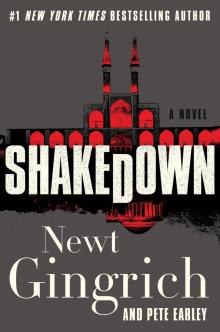 Shakedown
Shakedown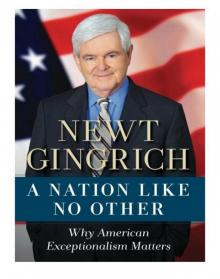 A Nation Like No Other
A Nation Like No Other To Try Men's Souls - George Washington 1
To Try Men's Souls - George Washington 1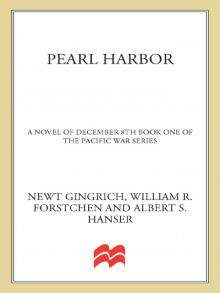 Pearl Harbor: A Novel of December 8th
Pearl Harbor: A Novel of December 8th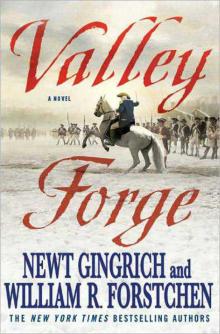 Valley Forge: George Washington and the Crucible of Victory
Valley Forge: George Washington and the Crucible of Victory To Save America
To Save America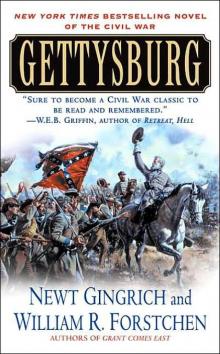 Grant Comes East cw-2
Grant Comes East cw-2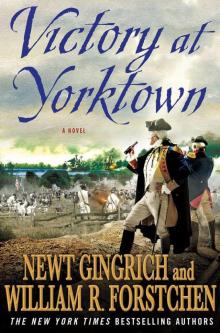 Victory at Yorktown: A Novel
Victory at Yorktown: A Novel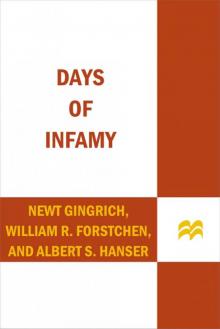 Days of Infamy
Days of Infamy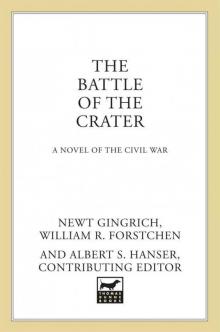 The Battle of the Crater: A Novel (George Washington Series)
The Battle of the Crater: A Novel (George Washington Series)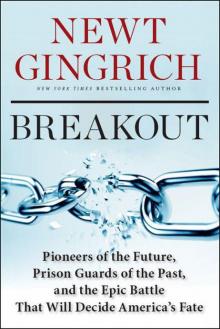 Breakout: Pioneers of the Future, Prison Guards of the Past, and the Epic Battle That Will Decide America's Fate
Breakout: Pioneers of the Future, Prison Guards of the Past, and the Epic Battle That Will Decide America's Fate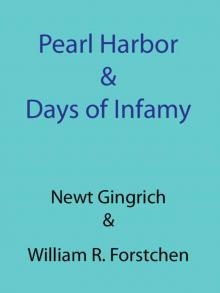 Pearl Harbour and Days of Infamy
Pearl Harbour and Days of Infamy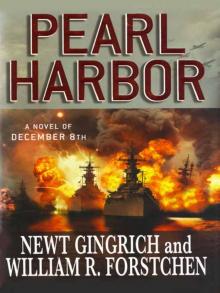 Pearl Harbour - A novel of December 8th
Pearl Harbour - A novel of December 8th Understanding Trump
Understanding Trump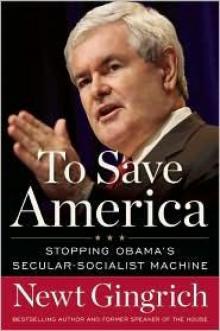 To Save America: Abolishing Obama's Socialist State and Restoring Our Unique American Way
To Save America: Abolishing Obama's Socialist State and Restoring Our Unique American Way